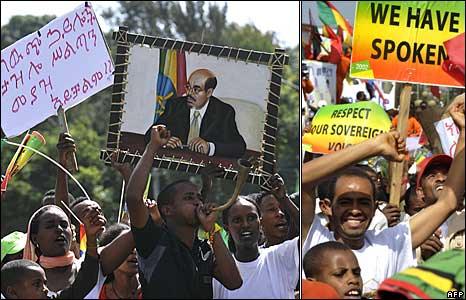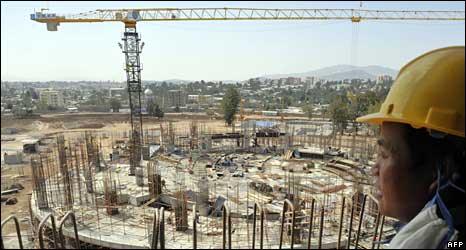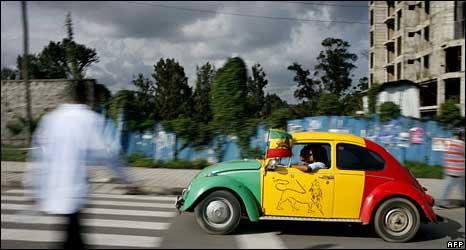Donor darling: What Ethiopian poll can teach Africa
- Published

Ruling party supporters have been angered by foreign criticism of the polls
What do a sports car and the Ethiopian opposition have in common? They both have two seats.
This joke is doing the rounds in Ethiopia after an almost embarrassing landslide victory for the governing EPRDF party and its allies left the opposition with just a lonely brace of seats in the 547 member parliament.
There is no word for "landslide" in the local Amharic language, but they need one now.
The European Union said the polls were marked by restrictions on political freedom and the unfair use of state resources, and there is international concern over increasing repression in Ethiopia.
But Prime Minister Meles Zenawi will not be losing any sleep.
A thorough trouncing is much better for the nerves than a nail-biter and it is unlikely that Ethiopia's relationship with donor countries will change significantly even if a few fingers are briefly wagged.
The money will keep flowing.
"The United States has every right to use its tax payers' money as it sees fit," Mr Meles told reporters after his victory.
"If they feel that the outcome of the elections are such that they cannot continue our partnership, that's fine.
"We shall be very grateful for the assistance they have given us so far and move on. Clearly we are not a protectorate," he concluded.
Such comments are easier for Mr Meles to make now that he has a new friend in China - it will not utter a squeak over the elections.
Islamist buffer
China is helping with many infrastructure projects in Ethiopia - including an offer of a $500m (£344m) loan from the Industrial and Commercial Bank of China for the construction of the controversial Gibe Three hydroelectric dam.
Ethiopia receives aid worth around $2bn a year, mostly from the US and the UK.
The feeling amongst many donor countries is that the country desperately needs help in fighting poverty, and the money is being spent relatively wisely by Mr Meles's government.
They see real progress: For example, a recent report by American researchers pointed to success in reducing child mortality.

China is behind many infrastructure projects in Ethiopia
The report said that in 1990, 202 Ethiopian children per 1,000 died before the age of five. In 2010, the rate had halved to 101 deaths per 1,000.
Of course, Ethiopia still has a long way to go in comparison to somewhere like Singapore, where there are just two deaths per 1,000 children under the age of five.
Ethiopia is also a donor darling because it is seen as an invaluable buffer against the growing Islamic extremism in Somalia.
When it comes to America's foreign policy, any concerns over shrinking democratic space or eye brow leaping election results are totally trumped by any help in "the war on terror".
Mr Meles could be receiving a few phone calls from other African leaders searching for election tips.
Paul Kagame of Rwanda may not need the advice but his neighbour in Uganda, Yoweri Museveni, could do with a few hints on how to change the face of politics in the capital, Kampala, ahead of 2011 elections.
The Ethiopian capital is famous for staging the hugely popular 10km race, the Great Addis Run, but now all talk is of "the Great Addis Turn Around".
Greatest enemies
In 2005, the opposition won all 23 parliamentary seats in Addis. In 2010 it kept just one. How?
The efficient well-oiled governing party machinery was a key factor - I lost count as to how many people told me that "the EPRDF only woke up in 2005".
It was helped by the fact that the opposition was divided and fairly disorganised.
But many Ethiopia watchers suggest you have to look at what happened to the opposition over five years to get the whole picture.
Almost 200 opposition supporters were shot dead when they demonstrated against what they saw as election theft in 2005; thousands were arrested, including opposition leaders who were sent to jail for close to years.
Birtukan Mideksa remains behind bars after being accused of breaking the terms of her pardon.
Press freedom has also been under attack. Journalists have fled the country since 2005 and if you try sending an e-mail from Ethiopia to the Committee to Protect Journalists, it miraculously bounces back.
Filming on the streets of Addis Ababa, it was hard to find people prepared to say on camera that they supported the opposition - many suggested that would be asking for trouble.

Addis Ababa has undergone great change in the last five years
The governing party dismisses all these allegations but analysts point out that the Ethiopian government is only willing to allow a certain degree of democracy and that will always be the root of friction with the donors - China excluded.
US-based Human Rights Watch said the government pressured, intimidated and threatened Ethiopian voters and said the most salient feature of the election was the months of repression preceding it.
One publication recently suggested that the Ethiopian government's greatest enemies were Eritrea and the weather. Human Rights Watch could also be added to the list.

It clearly angered the government as it shone a light on allegations of repression that no election observer team would be able to find - partly because they were not allowed in the country early enough.
But the African leaders hoping for tips from Mr Meles should also realise that hard work is also useful ahead of an election - it wins votes.
The scale of the housing estates being built on the edge of Addis Ababa is nothing short of staggering.
Time will tell how good the quality of the construction is, but there are also impressive eight-lane roads leading to these suburbs.
The development is by no means restricted to the capital: access to healthcare has improved in the rural areas and in Lalibela, 700km (about 435 miles) away from Addis Ababa, new classrooms are springing up and roads built.
Kenyans, Ugandans and others may be freer than Ethiopians but their list of "What my government has achieved" would be miserably short in comparison.
- Published25 May 2010
- Published21 May 2010